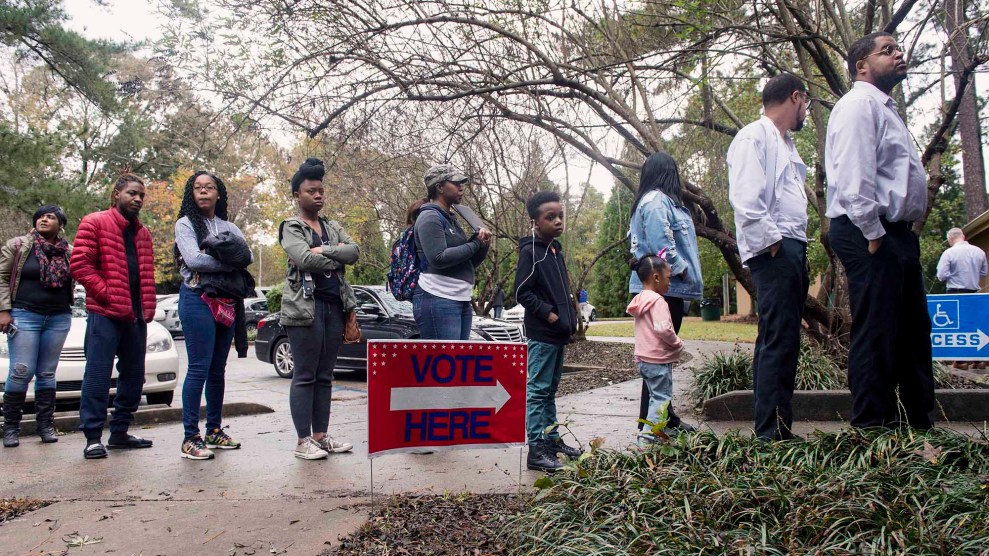(Atlanta, GA) — The Georgia General Assembly approved redistricting maps for the state house, the state senate, and U.S. Congress that are based on the unconstitutional and impermissible use of race. These racially gerrymandered maps dilute the voting strength of Black voters and other voters of color, according to a lawsuit filed Thursday by civil rights advocates against Georgia Gov. Brian Kemp and Secretary of State Brad Raffensperger.
The Lawyers’ Committee for Civil Rights Under Law, Crowell and Moring LLP, and the Kurt Kastorf Law Firm are representing the Georgia State Conference of the NAACP, GALEO Latino Community Development Fund, Inc., and the Georgia Coalition for the People’s Agenda. The complaint was filed in the U.S. District Court for the Northern District of Georgia Atlanta Division.
According to the suit, the Georgia legislature’s consideration of race was the dominant factor in redistricting decisions. The legislature and its line drawers ignored the astounding growth of communities of color in failing to create additional majority-minority districts in the House and Senate Congressional maps. The general assembly should have created majority-minority districts that recognized the growth of populations of people of color, but instead it took pains to in some instances spread voters of color around so as to dilute their impact or and in other instances packed them unnecessarily into districts that were already effective majority-minority districts. Both are classic techniques of illegal racial gerrymandering used to undermine the voting strength of communities of color.
The lawsuit requests that the court invalidate these new maps on the grounds that they violate the Fourteenth Amendment to the U.S. Constitution, which guarantees equal protection under the law, and Section 2 of the Voting Rights Act of 1965, which prohibits efforts to dilute the voting power of protected groups that have historically faced racial discrimination in voting.
“The majority party in Georgia purposely ignored the population growth of people of color and impermissibly used race to try to maintain control of Georgia’s congressional delegation, as well as the entire General Assembly,” said Ezra Rosenberg, co-director of the Voting Rights Project with the Lawyers’ Committee for Civil Rights Under Law. “It was unlawful and unconstitutional when the Democrats did it decades ago, and it is no less so when the Republicans do it today. States cannot use race to achieve political ends – particularly when they do it at the expense of the voting rights of people of color.”
“The blatant attempt to quiet the voice of the Black community in Georgia by drawing lines that hurt our voting power is unconscionable,” said Elder Edward DuBose, member of the national board of directors for the Georgia NAACP. “It is clear that those in power seek to maintain control not by working to make our communities better or advocate on behalf of the people, but through deceptive practices that disenfranchises and stifles the Black electorate’s vote.”
“The General Assembly’s redistricting plans constitute a shameful exercise in racial gerrymandering and depriving voters of color of an equal opportunity to elect candidates of their choice,” said Helen Butler, executive director of the Georgia Coalition for the People’s Agenda. “It is unlawful and unconstitutional and should not stand. The General Assembly not only ignores the growth of minority communities that support majority minority districts around the state, but also uses minority voters like pawns to further the majority party’s goals.”
According to the 2020 census Georgia was among the top five states gaining population in the past decade. Despite the well-documented undercounting of racial and ethnic minorities in the 2020 Census, the results show that the state’s Black population increased by 12.5%, Latinx population by 31.6% and Asian American Pacific Islander (“AAPI”) population by 52.3%, while Georgia’s white population decreased by 4%.
“The growth of the Latino community, as is the case of the growth of other communities of color, has been the driver of Georgia’s increase in population,” said Jerry Gonzalez, CEO of GALEO Latino Community Development Fund. “The maps drawn by the Georgia legislature do not reflect this – and in fact reflect the opposite – is insulting to communities of color in Georgia.”
“We are proud to join the Lawyers’ Committee for Civil Rights Under Law in opposing Georgia’s redistricting plans,” said Toni Michelle Jackson, partner in Crowell & Moring’s Litigation Group. “These plans were enacted with discriminatory intent, and they constitute illegal racial gerrymandering. We urge state officials to reconsider these plans and ensure the state does not continue its history of seeking to marginalize Black, Brown and Asian voters.”
Read the lawsuit here and appendix 1.
###
About the Lawyers’ Committee for Civil Rights Under Law – The Lawyers’ Committee for Civil Rights Under Law (Lawyers’ Committee), a nonpartisan, nonprofit organization, was formed in 1963 at the request of President John F. Kennedy to involve the private bar in providing legal services to address racial discrimination. The principal mission of the Lawyers’ Committee for Civil Rights Under Law is to secure, through the rule of law, equal justice for all, particularly in the areas of voting rights, criminal justice, fair housing and community development, economic justice, educational opportunities, and hate crimes.


